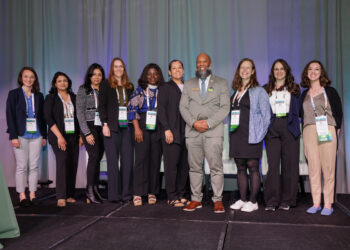
- Image via CrunchBase
The SSP Annual Meeting session, “Now on the Horizon: Start-ups and Scholarly Apps That Can Change Your World,” was held Friday morning in Baltimore.
Tom Scheinfeldt from George Mason University led off and talked about the wonderful transparency of the Web, which allows scholars to modify their research patterns and co-opt commercial software to share, publish, link, and build niche channels. He showed two applications, one of which I’ve seen before, one that I haven’t:
- Zotero (seen before), a slick reference manager and Firefox plugin that works well and has a nice interface. While comparable to Evernote but without some features like text recognition in images, Zotero is slick and intuitive. Will it change the world? It might make it better if you’re trying to organize your life locally. The issue I see is that many people have given up on creating their own file systems, relying instead on Google searches to find sites they’ve seen before and want to revisit.
- Omeka, a tool allowing curators (in the true sense) to present their collections virtually and create a community around them, looks pretty interesting. A good example is around Digital Worcester (and, boy, did people in the early 20th century have nice handwriting — all this keyboarding is making good cursive as elusive to us today as calligraphy was to us growing up). You really get a sense of how a tool like Omeka could help transport museum and scholarly holdings online in a meaningful way.
Kevin Stranack of the Public Knowledge Project talked about Open Journal Systems they’ve been developing. It’s positioned as a content management system for peer-reviewed journals, and meant to make the online publication of journals more cost-effective and efficient. Kevin stated that 2,000+ journals are using it today. It has a plug-in architecture and is multilingual. Judging from the journal list, most of the clients are in the developing world or very fringe (my two favorites near the top of the list are “The British Journal of Mormon Studies” — who knew?! — and the “British Journal of Higher Education in Further Education,” which led to a “Page Not Found” error — oops! Other journals I tried to link to while listening didn’t quite do what I thought they would, so I’d take that 2,000+ journal claim with a big grain of salt). It struck my optimistic side as the perfect disruptive entrant in the journal platform world — coming in through a part of the market the big players ignore, having a set of strengths that at first might appear to be weaknesses, and being something current entrenched managers at major journals would be loathe to recommend. It seems to work well in very modest applications, has a proven architectural approach, addresses a key set of customer needs, and is maturing nicely. They also have a conference system and a monograph press in the same mold. That said, it didn’t take much poking at the journal system to see problems and limitations (e.g., usability issue is when you enter a search term and hit Enter, nothing happens — instead, you have to go to the bottom of the page and click the “Search” button, a basic usability issue I thought we’d killed years ago). But I’d keep my eye on this one.
The last speaker was Victor Henning from Mendeley, who used Last.fm as the analogy to Mendeley — but instead of an audioscrobbler that selects tunes you might like based on a variety of algorithm-driven metadata and song analysis magic, Mendeley is supposed to help you find papers related to what you’re reading or generally read, regardless of journal title or perceived prestige. Mendeley is a desktop application that works with a Web component to organize PDFs into a discoverable space for scholars. TechCrunch has a good article about them, one that’s quite recent, as well. They’re currently on version 0.6, and MIT, Stanford, University of Michigan, and University of Edinburgh are their top users. Uploads are rising quickly. Since January, 1.5 million papers have been uploaded, and the size of the database is doubling every 6-8 weeks. Victor also talked about how Mendeley is trying to deal with the latency and limitations of the current impact factor. He alleged that Mendeley could generate a usage-based impact factor (but he didn’t mention how this could be gamed, as Phil Davis showed in a post last year). Phil has also blogged about the problems with usage-based counting overall. This part of Mendeley’s mission seems quixotic to me, and unnecessary. Victor then waxed eloquent about the possibility that Mendeley could provide an e-commerce platform (frictionless, with price differentiation based on known demand) for publishers, referring to Geoff Bilder’s talk from yesterday about iPub. However, it’s not in existence now, just on Vincent’s list of things to do. He seems to have a long list. I feel for the guy.
In my opinion, Mendeley should focus a bit more. Who is their audience? Scholars doing document discovery? Journals seeking a new impact measure? Publishers seeking an improved e-commerce platform? What is their goal? They might be able to build everything they want to, but what will they market and sell? Mendeley seems like a lot of brainpower and lofty ambitions that needs some focus to succeed. Given that they’re in version 0.6, my hope is that it does focus before 1.0 is released.
Overall, a good session and thought-provoking. Questions were good, and the audience engaged.
Discussion
5 Thoughts on "Now On the Horizon: Start-ups and Apps That Can Change Your World"
I’m curious if, in a room full of publishers, Victor mentioned that Mendeley allows users to upload copyrighted material and redistribute it to other users? Seems to me they’re making many of the same mistakes Napster made, and if their service catches on, they’re likely to get hammered by lawsuits from copyright holders. CiteULike has a similar function so they may run into the same trouble as well.
Thank you for the write-up and your comments, Kent. I have to catch the Amtrak to NY, so I’ll have to keep it short…
Our focus is definitely on the end-user, i.e. researchers. All of the things I described today (research statistics or a download store) are things that would make the lives of researchers easier. Speaking at a publishers’ conference, I was naturally trying to address how we could work with publishers to achieve this.
David: I did bring it up, but no one threw things at me 🙂 It is, after all, a very controlled sharing functionality that can’t be compared to free-for-all P2P services like Napster. As I emphasized today, our goal really is to work with publishers, not against them.
Hey Victor–
Glad to hear there were no angry mobs with torches and pitchforks. I’ll be really curious to see if the limits you’re employing make any difference. I’m pretty sure that if I started a new version of Napster that allowed people to upload mp3s of songs and share them with 8 other people, the RIAA wouldn’t put up with it. While I hope my scholarly publishing brethren are somewhat less litigious than the RIAA, legal precedence seems to be in their favor.
I think there are some great ways that Mendeley can partner with publishers to the mutual advantage of both, and I hope you succeed in avoiding an adversarial relationship.
![Reblog this post [with Zemanta]](http://img.zemanta.com/reblog_e.png?x-id=3b997fd4-64f5-4dc9-b826-b5a4b79a22b1)


